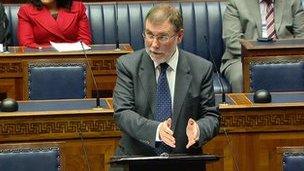Unanswered questions on welfare reform
- Published
- comments

Nelson McCausland addressed the assembly on welfare reform on Monday
Earlier this month MLAs embarked on a marathon debate over Welfare Reform.
Sinn Fein's attempt to delay the bill's second stage prompted an angry response from the DUP, who claimed they were taking a more responsible approach than their chief partners in government.
Social Development Minister Nelson McCausland continued this theme on Monday, unveiling significant concessions from the Department for Work and Pensions (DWP) in London about how any future benefits in Northern Ireland will be paid.
Mr McCausland portrayed this as a vindication of the DUP's strategy to give "a voice to the poor and vulnerable at Westminster", but when it became clear the reforms were going ahead to press the UK government for operational flexibilities.
Sinn Fein's Alex Maskey challenged the minister's political commentary claiming it was "interesting that we did not hear anything about the flexibilities being conceded by the British government until after the recent very lengthy, protracted debate in the assembly".
So did the DWP buckle because of Sinn Fein's protest action or due to months of lobbying by Mr McCausland?
Immediately after the second stage debate I directed a number of questions to the DWP about the three precise areas of flexibility announced by Nelson McCausland this week.
The London department declined to answer my questions, but after several days provided me with a bland "holding answer".
'Debate sham'
This is fairly standard news management, as both the London DWP and the Belfast (Department of Social Development) DSD were no doubt keen to save the "glad tidings" for the social development minister to impart direct to MLAs.
However it meant I couldn't test the veracity of some well placed officials who told me the marathon Stormont welfare debate had been a "sham" because both the DUP and Sinn Fein knew in advance that London was happy to concede operational flexibility.
Indeed I quoted this claim by the officials on 10 October, 12 days before Mr McCausland announced he had won the battle for flexibility.
Whatever the timeline, the concessions appear to have taken much of the sting out of the welfare story.
Sinn Fein has said more work needs to be done. The SDLP talks about appeasement. Both parties are due to meet the London welfare reform minister Lord Freud this week.
However, the complaints about monthly payments, payments to tenants rather than landlords and all a household's money going to one person have been the most obvious weak spots in the new welfare plan.
Each area has now been addressed.
What's still unclear is how much the "operational flexibility" might cost and who will pay the bill for any necessary modifications to the UK wide computer system.
That was one of the questions I directed to the DWP which the London department declined to answer.
However, a DWP source did suggest to me informally that Northern Ireland would have to fund any IT cost.
The Northern Ireland Social Development Department tells me the financial implications are still "under discussion".